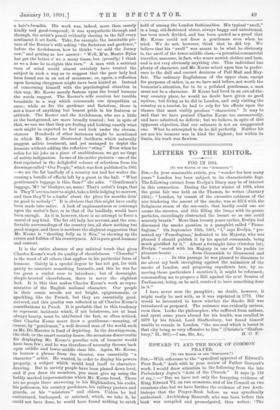LETTERS TO THE EDITOR.
FOG IN 1684.
[To THE EDITOR Or Tau s SPECTAH031.1 Sin,—In your seasonable article, you "wonder for how many years" London has been subject, to its characteristic fogs. The following extract from Evelyn's Diary may be of interest in this connection. During the bitter winter of 1684, when the great fair was held on the Thames, he writes (January 24th): " London, by reason of the excessive coldness of the sire hindering the ascent of the smoke, was so fill'd with the fuliginous steam of the sea-ooale, that hardly could one see crease the streetes, and this filling the lungs with its grosse particles, exceedingly obstructed the breast so as one could scarcely breath." More than twenty years earlier, Evelyn had discussed the smoke question in a pamphlet called " Fume- fugium." On September 13th, 1661, " I," says Evelyn, " pre- sented my Fumefugium,' dedicated to his Majesty, who was pleased I should publish it by his special commands, being much gratified by it." About a fortnight later (October lst), Evelyn, " seated with his Majesty in one of his yachts (or
pleasure-boats) from Greenwich to Gravesend and back In this passage he was pleased to discourse to
me about my book inveighing against the nuisances of the smoke of London, and proposing expedients how, by re- moving those particulars I mention'd, it might be reformed ; commanding me to prepare a Bill against the next Session of Parliament, being, as he said, resolved to have something done in it."
I have never seen the pamphlet; no doubt, however, it might easily be met with, as it was reprinted in 1772. One would be interested to know whether the Smoke Bill was introduced as proposed. The nuisance was evidently serious, even then. Locke the philosopher, who suffered from asthma, and spent some years abroad for his health, was recalled in 1679 by his friend, Lord Shaftesbury, but found himself unable to remain in London, "the sea-coal which is burnt in that city being so very offensive to him" (Christie's "Shaftes- bury," II., 361).—I am, Sir, &c., H. C. F.
































 Previous page
Previous page